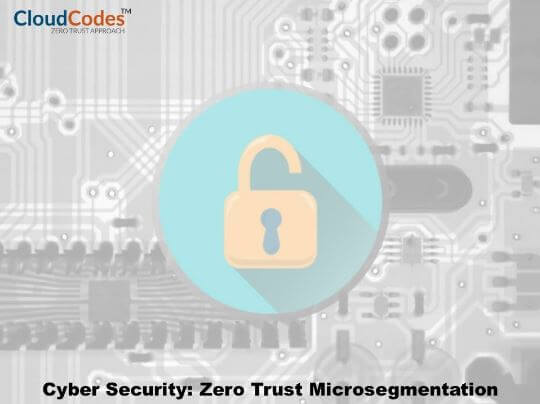Implementing Zero Trust security for the Cloud infrastructure and network involves a data-first approach while using Microsegmentation. Microsegmentation is the critical component that individually segregates the workload in any cloud infrastructure or virtual working environments to apply a granular scheme. Organizations have become more vigilant and are adopting the Zero Trust microsegmentation cybersecurity strategy. The strategy is to treat each entity within the network to be hostile or a threat, be it any previously verified workload or whose authentication is pending. Any endpoint, workload within a system is treated as malicious, and any application within the cloud infrastructure has the onus of its security. The development and DevOps teams can have a scaled and efficient development cycle and have sprinted releases, all while using the container and Microservices technology without the hassle of security issues. This approach is new and in a nascent stage; there is a lot more yet to be done. However, organizations can implement it throughout their infrastructure and get efficient results.
Reasons to Refrain from IP Address based Cloud Security Policies
In the enterprise setting, the volatility of the environments and nature of the cloud app development poses a challenge to the traditional policies. Validation of the workload which travels across locations in the cloud infrastructure is a pressing issue. Applications scaling and dealing with the fluctuation of the demands within any application as containers zoom in and out are validation concerns. Many organizations rely largely upon IP Address based security which can quickly become incommodious and present problems in volatile environments. The APIs are exposed via HTTP/gRPC standards in the microservice, making the IP address obsolete and immaterial for security. The introduction of relocating IP domains by hybrid multi-cloud enterprise environments is because of the segmented workloads' replicating and rescheduling properties. The solution for this particular issue would be to tie the IP flows across the varied and distributed environments to achieve end-to-end visibility, which seems impractical at the larger levels. In a cloud infrastructure, the IP address is not reliable for identifying the workloads as they are not diligent. This is why the push to use the Zero Trust microsegmentation is the future for security.
Identity-Based Microsegmentation
The traditional reliance on the IP address as the identifier in the network segmentation technologies is soon to be obsolete. The gradual transposition to the public cloud or native cloud infrastructure makes the IP address-based approaches a breaking point in the security system. Identity-based Microsegmentation decouples the security from the network and assigns each workload a cryptographic identity. This helps to discover each workload even if there is a change in IP; the application communication can be learned across the cloud infrastructure. It allows authenticating and authorizing each connection in the system.
The best practice to secure an organization's network against malicious activities and threats is with the Zero Trust microsegmentation approach. This is the way to go forward for your security teams. Zero Trust policy for the cloud-native apps allows the developers to use the containers and Microservices seamlessly without fretting about security. CloudCodes is well-known for the ability to implement microsegmentation for Cloud infrastructure and networks.

